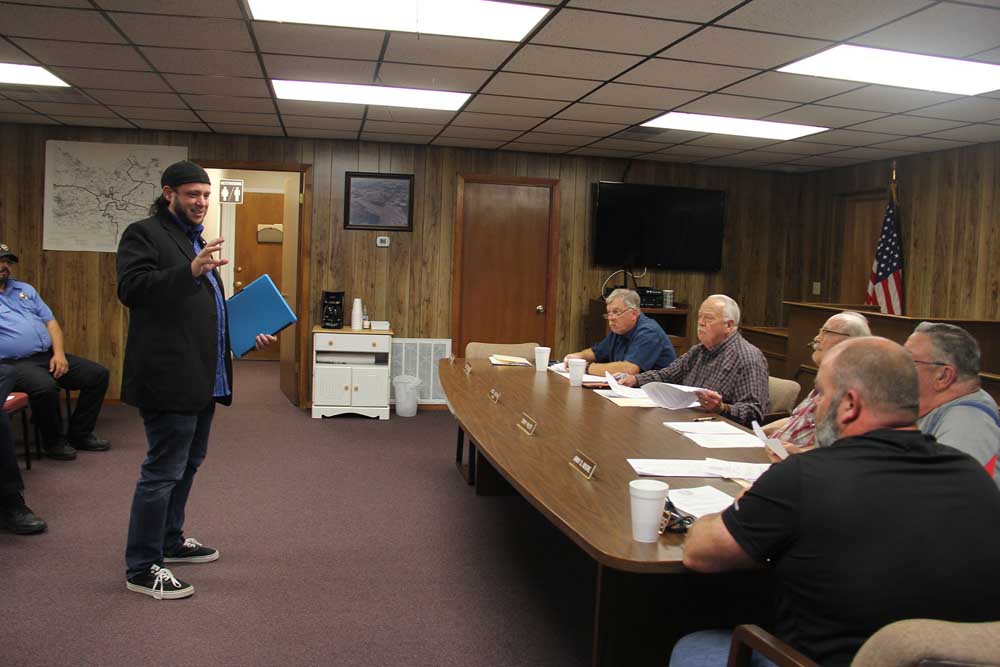ACLU withdraws “Sanctuary Cities for Unborn” lawsuit after cities make amendments
Published 7:03 pm Tuesday, May 26, 2020

- Mark Lee Dickson Director of East Texas Right to Life addresses the Waskom City Council on Tuesday.Dickson continued to say if NARAL Pro-Choice Texas and Lilith Fund want to spend more money on “Abortion is Freedom” billboards in the sanctuary cities, just like the ones the organizations erected after Waskom outlawed abortion, then he welcomes them to do so.
The American Civil Liberties Union has withdrawn its lawsuit against seven cities in Texas that have enacted ordinances outlawing abortion within city limits. Each of these seven cities has also proclaimed itself a “Sanctuary City for the Unborn,” joining a movement spreading across the state of Texas.
The American Civil Liberties Union announced Feb. 25 it had filed a lawsuit on behalf of the Lilith Fund and the TEA (Texas Equal Access) Fund to challenge abortion ban ordinances passed in seven East Texas cities. The cities named in the lawsuit were the cities of Waskom, Naples, Joaquin, Tenaha, Rusk, Gary and Wells. The lawsuit was dropped on Tuesday.
The ACLU’s decision to withdraw its lawsuit comes after those cities amended the ordinance. The lawsuit noted that both groups are labeled “criminal entities” under the abortion ordinances. It accused the ordinances of being unconstitutional and violating the abortion funds’ rights to free expression and association under the First Amendment.
The cities amended the ordinances by decriminalizing the organizations in the language used. However, the ordinances maintain prohibition on abortion within the city limits.
“Y’all remember those towns that tried to ‘band abortion’ [sic] and say our work made was “criminal organizations?”, the Lilith Fund tweeted, claiming victory on Tuesday. “Yeah we sued and they backed down real quick.”
However, Right to Life of East Texas is also claiming victory.
Mark Lee Dickson, Director of Right to Life of East Texas, who drafted the ordinances says that the removal of the designation of the Lilith Fund and the TEA Fund as ‘criminal organizations’ does not change the fact that if the Lilith Fund or the TEA Fund pays for an abortion which takes place within any of the Sanctuary Cities they will still be breaking the law according to the ordinances.
“This is a total and complete victory for the cities that have enacted these ordinances,” said Dickson. “We said from the outset that there is no legal basis to challenge these ordinances, and they have been vetted by expert legal counsel. We’re pleased that the ACLU realized this and decided to withdraw its lawsuit.”
“As expected, these strong and enforceable ordinances have successfully withstood legal scrutiny,” Texas Right To Life stated in part in a release on Tuesday. “Pro-Life Texans can continue to find encouragement in these citizens’ courageous commitment to stand up for the innocent pre-born children in their own communities, even and especially in the face of superficial legal challenges.”
In the long run, Dickson expects that the lawsuit will draw more attention to his cause. Dickson encourages cities who have considered the ordinance in the past and have voted it down over fear of a lawsuit to revisit the ordinance and outlaw abortion within their city limits.
“This lawsuit was nothing but a publicity stunt to deter other cities from creating sanctuaries for the unborn,” Dickson said. “But it will end up having the opposite effect. Now even the ACLU acknowledges that there is no basis for challenging these ordinances, and this will embolden other cities and towns to join the sanctuary city for the unborn movement.”
Other cities in Texas that have outlawed abortion but were not named in the ACLU’s lawsuit include the cities of Gilmer, Westbrook, Colorado City, and Big Spring. The city of Whiteface also voted to outlaw abortion after the ACLU lawsuit was filed.






